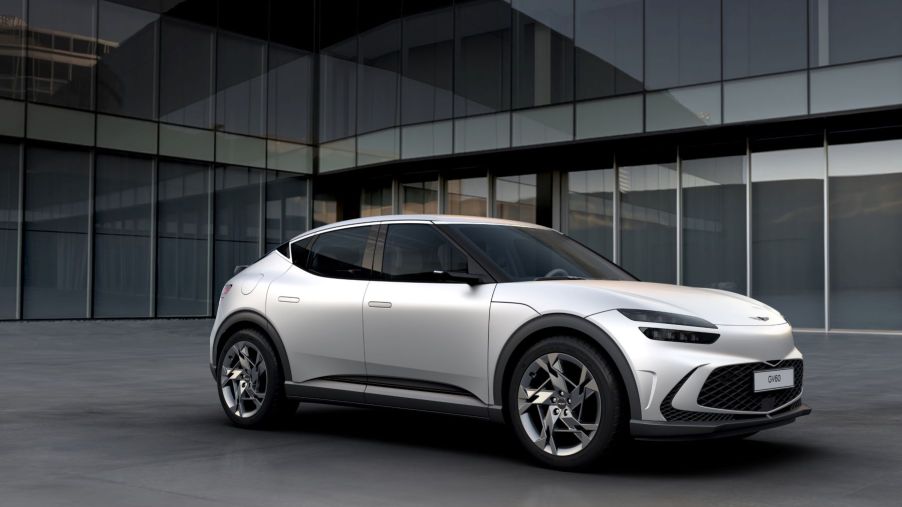
3 Reasons to Buy a 2023 Genesis GV60, Not a Tesla Model Y
The luxury EV market is expanding with a new electric vehicle announced by a different car manufacturer every few weeks. One of these recent entries is the Genesis GV60, and it’s caused quite a stir in the auto market. So, how does the South Korean automaker’s first EV compare against luxury EVs that have been in the market for longer? Here are the three main reasons to buy the 2023 Genesis GV60, not the Tesla Model Y.
1. The Genesis GV60 is available with a lower starting price

As a luxury EV brand, Tesla isn’t known for having affordable offerings, with most of its electric vehicles costing a premium. It’s the same for the 2022 Tesla Model Y Long Range base model, which starts at $62,990, according to U.S. News. For this price, buyers get exemplary fuel efficiency, extended range, and all-wheel drive with fairly preppy acceleration.
With all these perks, it’s still about $4,000 more than you’d have to pay for the Genesis GV60’s base trim, priced at $58,890 according to Top Electric SUV. You’ll likely not get more than 300 miles of range at this price. However, this won’t matter much if you don’t plan on going for long road trips in your electric SUV. Additionally, compared to the Tesla, you’ll have significant funds left over for a home charging station or some optional features.
The price gap seems to narrow with the higher trims. For context, the Tesla Model Y Performance gets more power out of its motors for faster acceleration with a $67,990 starting price. The Genesis GV60 top trim motors are also tweaked for performance and faster acceleration, with the starting price raised to $67,890. That said, the GV60 is more ultimately accessible than the Tesla if you have limited funds.
2. The Genesis GV60 offers a better warranty
According to Car and Driver, the Genesis GV60’s warranty is divided into three main parts. The shortest cover for buyers is the complimentary maintenance cover which is available for three years or 36,000 miles. Next, there’s the five-year/60,000 limited guarantee and the impressive 100,000-mile/10-year powertrain cover. Autoblog also lists unlimited miles for corrosion and roadside assistance guarantees.
The 2022 Tesla Model Y‘s warranty is a little less impressive, with the basic cover running for four years or 50,000 miles, depending on whichever comes first. The corrosion or rust cover is the same as the GV60’s, with the addition of a warranty for seat belts and airbags running for five years. Lastly, there’s the eight-year or 120,000-mile powertrain cover, which according to Motor1, drops to eight years or 100,00 miles for the Performance variant.
3. Tesla doesn’t offer wireless charging with the Model Y
As the front runner in the electric vehicle market, Tesla may have been the better-positioned to introduce wireless charging for EVs. However, it seems that Genesis got the jump on the California-based electric car manufacturer when it introduced wireless charging with the GV60. Notably, this service is still in the early stages of its roll-out and hasn’t reached the U.S.
There are currently only three wireless charging stations in South Korea, namely in Hyundai Motorstudio Goyan and the Genesis Suji and Genesis Gangnam facilities. The manufacturer plans to add about 72 more during the pilot project.
Also, the fact that Genesis partnered with U.S.-based WiTricity to develop the technology should be good news for U.S. buyers. They might not get to use wireless charging immediately after purchase, but the infrastructure should catch up in the first few years of ownership.
Given that the 2022 Tesla Model Y doesn’t have wireless charging capabilities built-in, lovers of the electric SUV may need to wait for subsequent model years to get the feature.


